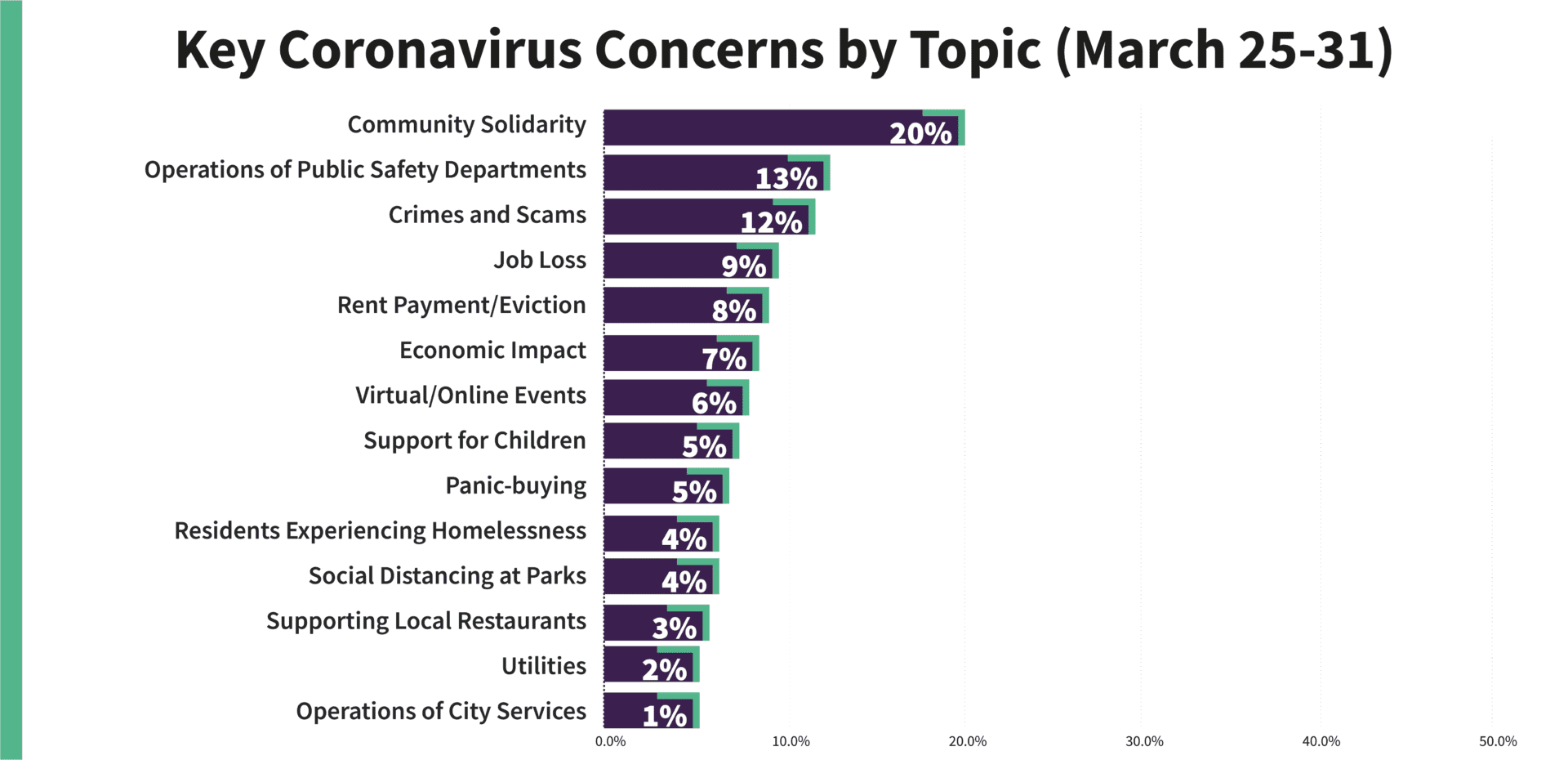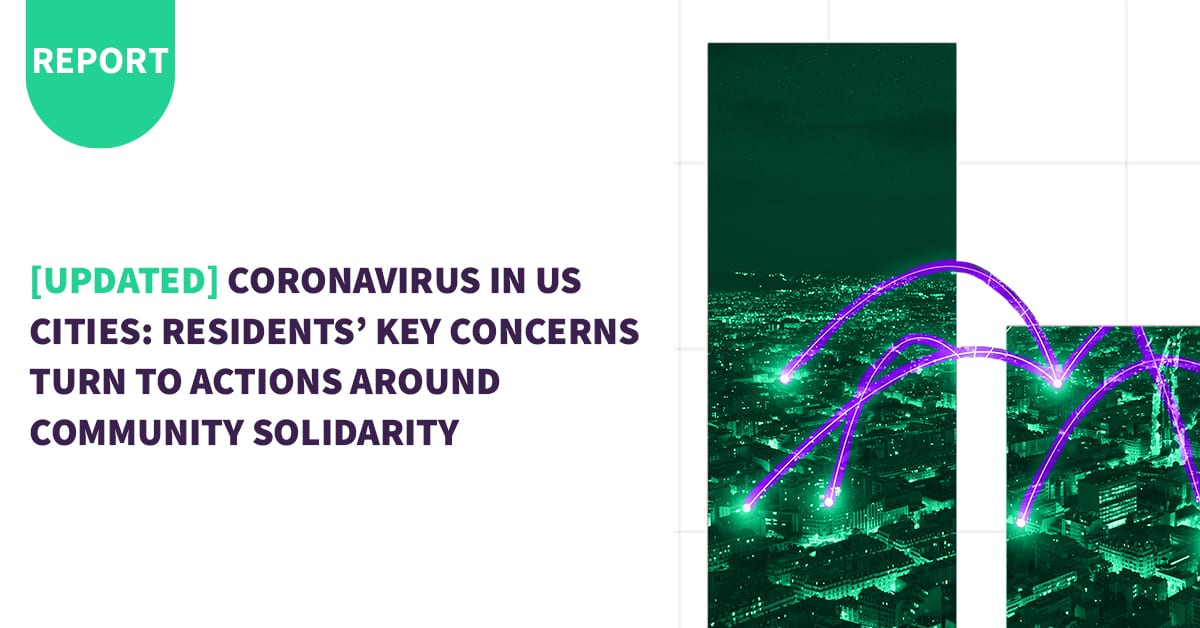[Updated Data] Coronavirus in US cities: Residents’ key concerns turn to actions around community solidarity
![[Updated Data] Coronavirus in US cities: Residents’ key concerns turn to actions around community solidarity - Zencity](https://blog.zencity.io/hubfs/zencity_brandmark_mint_rgb%20(1).png)
Zencity
The Platform for Community Trust
As the coronavirus new normal sets in and confines people largely to their homes, residents are continuing to utilize a range of social media platforms to voice their concerns/interests related to the outbreak. The public might be practicing “social distancing” in the physical realm, but digitally, they are more “socially interactive” than ever before.
This online discourse is indispensable for local governments. Why? In addition to the ongoing public health challenges, state lockdowns, and the major lack of emergency equipment, cities and counties- who can no longer meet their community in person- need to be able to quantify and process this online resident feedback as the situation evolves quickly. By monitoring these diverse concerns, local government teams can better adjust services and initiatives according to these “voiced” needs.
This is why our team has been diligently tracking changes in the public online discourse data week to week. As part of our research initiative throughout the month of March, we’ve assessed another week of online public discourse (March 25th -31st) presented in the analysis below. Since our initiative began in the first week of March, geared at supporting local government teams across the U.S., we’ve tracked over 18M data points across 125+ US cities and counties. From week to week we’ve seen significant changes in the top topics occupying public discourse- which serves as a testament to COVID-19’s far-reaching impact on daily life and confirmed case proliferation.
What changed week to week?
In the beginning of March, residents’ concerns were more centered around school closures, potential and/or official event cancellations, and public transportation sanitation and transmission risks. This discourse illuminated that residents were beginning to gauge and/or seek out information about how COVID-19 would affect key aspects of their routine. It also shows an underlying fear and uncertainty regarding transmission and social distancing practices.
In the following week, from March 11th to the 17th, we identified a significant focus on the operations of cultural/entertainment establishments (44% of comments), the impact on local restaurants and businesses, and panic-buying. We also saw city-owned social accounts serve as active members in the online discourse, especially in encouraging support for local businesses and establishments, sharing social distancing best practices, and announcements regarding city services and utilities.
Last week, from March 18th to the 24th, the key topics became even more diversified, highlighting the fact that COVID-19 has communities thinking about the very core of our social fabric, both for the good and the bad. On one end of the spectrum we saw an increased focus on crime and scams (13%) while at the other end- on a more positive note- we saw elevated discussions about new community solidarity and volunteering (12%) initiatives. Residents also discussed new realities such as support for children not in school, “ordering in” campaigns, and logistics associated with utilities and city services.
This week, we saw one key topic lead the pack and new concerns enter the public online discourse; reinforcing the fact that COVID-19 is driving our society to show it’s true colors.
Let’s examine how residents’ key concerns/points of interest have changed over this past week:

We see that while topics are extremely diverse, one topic in particular is clearly dominant. Residents have turned their attention to displays of community solidarity and resilience (20% of the discourse) which ranked as the second top concern last week (16% of the discourse).
In addition to conversations about food donations and fundraising for local residents, residents have turned their attention to support for first responders and healthcare providers. We saw calls for sanitizers, wipes, food, and money for those on the frontlines of the public health crisis. Additionally, considering the significant mask deficiency, residents across US cities have begun to sew face masks for those in need.
While this is an incredible show of strength and character from communities across the country, this is also a key theme that local governments have to be aware of, as there is a real opportunity to cooperate and support communities in their desire to organize and contribute. It is essential for local governments to be aware of these initiatives and their communities’ specific areas of focus, to ensure that their support makes the right impact.
In other themes, we also saw new topics rise to become top of mind, such as a preoccupation with evictions (8%) and logical fears surrounding unemployment (9%). Residents are also actively discussing concerns for those experiencing homelessness (4%). Let’s dive into the noteworthy changes and new concerns that entered the public online discourse this week:
Concerns about Job Loss/Employment
- A large portion of the discourse consisted of residents’ concerns about job loss and job security
- We also noticed a fair amount of posts from particular businesses which shared information about need for additional workers (mostly large retailers and supermarkets)
- Some cities actively participated in the discourse associated with this concern. We saw some cities’ chambers of commerce social accounts posting and directing residents to job openings and employment assistance
Concerns about Paying Rent/Eviction
- Many cities have passed policies that forbid landlords from evicting tenants during the outbreak
- Many residents have taken to social media to actively call for a rent freeze or rent strike. We also saw a lot of discourse about the subtopic of ‘rent suspension’
- Anxious and frustrated rhetoric around eviction; lots of calls for action from communities
- Many residents have actively voiced criticism about proposed policies (eviction ban, freeze on rent increases). We also saw other communities utilizing social media to circulate petitions and discuss online strikes
- We presume that this topic has increased in discourse volume because our assessment spanned the end of March, when rent is due
Concerns about the Homeless Community
- Residents are discussing and interacting with city/community-based initiatives to install portable restrooms and handwashing stations
- There has also been notable concern and discussion about the exposure of the homeless community to the virus and potential solutions for mitigating this risk
- There has also been increased discussion in the predicted rise of homelessness due to the economic crisis, job loss, and inability to pay rent
Virtual and Online Public Events
- Many residents are increasingly discussing and engaging with virtual/online events
- Examples of quarantine socializing range from dj streams and poker nights to charity concerts and city council meetings
Social Distancing in Parks
- There is a discrepancy across US cities in the policies for visiting parks, beaches and recreational sites and residents are actively discussing this inconsistency and related questions online. Some parks are closed, while some remain open. Feedback from residents is mixed as some claim that people are congregating while others feel it’s important to exercise and breath fresh air (keeping in mind the social distancing guidelines and transmission policies)
- Residents are also confused about what is “allowed” when it comes to outdoor exercise
- There have also been active calls from community members to enforce social distancing at parks. Some parks have even been closed due to lack of compliance with the CDC guidelines
Additional Points of Interest
- Operations of public safety departments remains a top interest over the past two weeks. In addition to the discourse we saw in the 3rd week of March we also saw residents discussing increased police patrols to enforce social distancing and disperse gatherings (especially in light of school closures)
- Support for children is still a key topic, with new discussions bubbling up about how school counselors can support students at this time
- In addition, we see that concerns for local businesses (4%) is still a discussed topic yet less prominent compared to the week prior, where it ranked as the fourth top concern (11%)
As local governments need to rapidly release new services and constantly share information with their community, we hope that these key concerns could help better inform teams on areas for prioritization this week. Clearly, residents are preoccupied with the repercussions of an economic downturn and are also seeking out community building initiatives.
We are working closely with our 130+ local government partner network to understand how they can best leverage our platform to help champion their communities in light of the coronavirus crisis. If you want to learn what they are doing and what we can do for your community, click here:
%20copy-1.png?width=544&height=120&name=Logo_black%20(1)%20copy-1.png)



